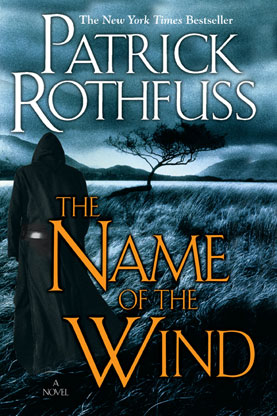 The Name of the Wind by Patrick Rothfuss
The Name of the Wind by Patrick Rothfuss
Read in September 2008
The story is told by the protagonist years after the events occurred. He’s actually dictating his life story to a wondering Chronicler so there is no real sense of danger when something terrible happens to him – you already know that he survives to tell the tale. It’s almost an autobiography of the main character (Kvothe) from pre-adolescent boy through “college” (as an adolescent). Definitely a coming-of-age tale of a renowned hero and adventurer.
Kvothe starts his story from his early days as a curious contented son of traveling entertainers. But all does not remain rosy, as he becomes an orphan by a tragic and horrific event. Kvothe survives, living on the streets, and eventually attends University to study to be an arcanist. Ill fortune often finds him and his curiosity and pride get him into trouble frequently.
Kvothe is the protagonist and the one relating his story. Denna is the love of his life, who he met on trip to University and keeps meeting sporadically throughout the rest of the tale. Ambrose is one of the annoying antagonists, the rich brat and bully at University who thinks he can put Kvothe in his place through any means at his disposal, including assassination attempts. The Chandrian are elusive terrifying beings who killed his family and the entire entertainer troupe and also wiped out everyone attending a wedding near the town of Trebon. Various Masters at the university both help and hinder Kvothe’s progress through his terms and he has a handful of friends who are fellow students, patrons or musicians.
Because the story is a story within a story, being told from the first person point-of-view, I only really connected with the main character when he was a helpless orphan fending for himself on the streets. Once he liberated himself from those dire circumstances, I could follow his progress through secondary education mostly by shaking my head at his thickheadedness – not over a lack of intelligence on his part but more the lack of experience socially. Typical coming of age stuff.
I would recommend this book to all fantasy readers. Be prepared to wait for the rest of the story, though, as the rest of the trilogy is not published yet.
I updated my rating to match my feelings for this book. It was the best book I read last year (2008) by far.









